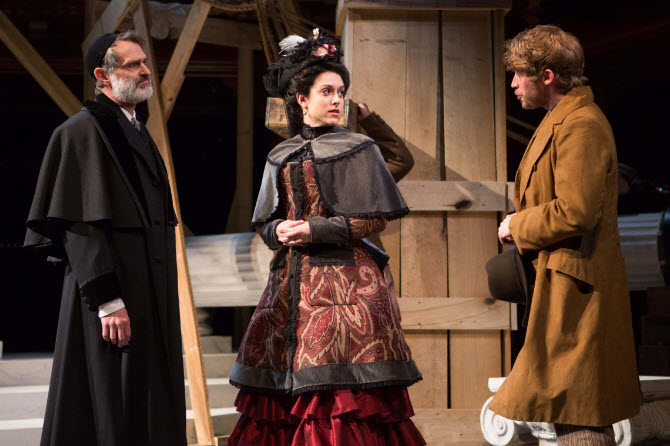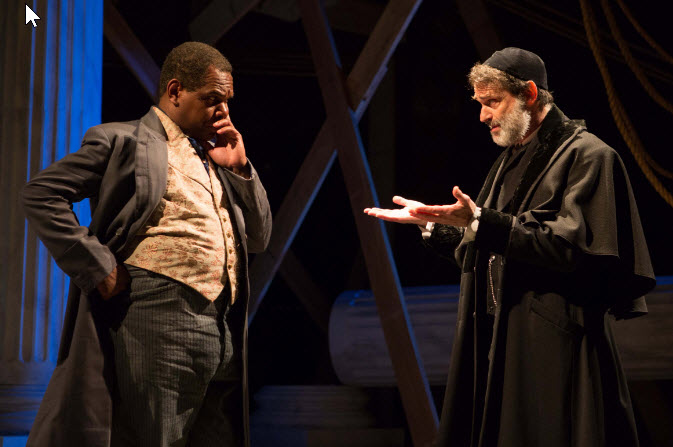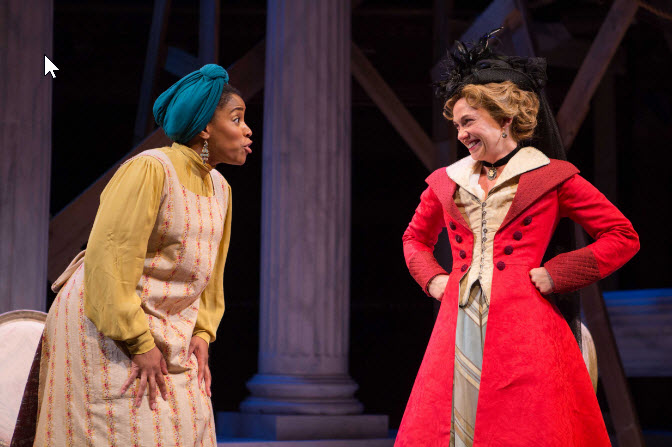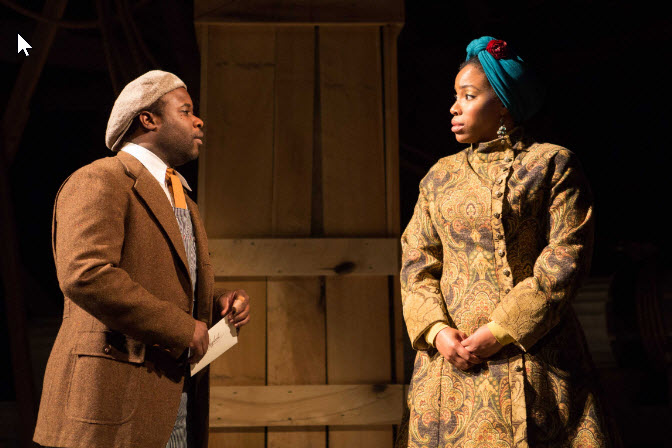Jordan Wright
June 12, 2016
Special to The Alexandria Times

Shylock (Matthew Boston) looks on disapprovingly as Lorenzo (William Vaughan) tries to steal a kind word with Jessica (Dani Stoller) – Photo by Teresa Wood
Resident Dramaturg, Michele Osherow, lays out the historical landscape behind playwright Aaron Posner’s architecture of his world premiere, District Merchants – a re-imagining of The Merchant of Venice. Commissioned by Folger Theatre as part of its 2016 celebration of 400 years of Shakespeare, this rendition becomes an exploration of class and difference among Blacks and Jews in the post-Civil War era.
To circumscribe the tumultuous times that defined the 1870’s when Blacks had won their freedom and the country was struggling to get its footing, Osherow reminds us that “the England into which Shakespeare was born had barred Jews for centuries.” And further, “that members of the Jewish race were believed to have murderous impulses”. In fact, she explains, in many instances violence against Jewish creditors were committed to avoid paying back debts. She faults “the hypocrisy of a world obsessed with cash and credit.” And it is within this context that we can better comprehend Posner’s intent to humanize Shylock.

Shylock (Matthew Boston, right) works out the terms of his loan with Antoine (Craig Wallace) in Aaron Posner’s ~ Photo by Teresa Wood.
Set amid the reconstruction era in Washington, DC, we find Shylock (Matthew Boston) and Antoine (Craig Wallace as the character better known as Antonio), two rapacious opportunists looking to make their fortunes in a dramatically altered nation. For Shylock it is money lending, aka loan sharking. For Antoine, a free Black man, it is any scheme that he can put his mind to. “You can think of me as an opportunistic philanthropist or a philanthropic opportunist, or you can just think of me as an American,” he boasts, neatly absolving himself of both guilt and responsibility.

Nessa (Celeste Jones, left) is stunned to hear of Portia’s (Maren Bush) inspired plan to disguise herself as a male lawyer ~ Photo by Teresa Wood.
In Posner’s version the beautiful heiress Portia (Maren Bush) struggles to assuage her White guilt with her Black maid Nessa (Celeste Jones), while at the same time, she is clueless that her adored suitor, Benjamin Bassanio (Seth Rue), is a penniless mulatto. Concurrently the pious Jewess Jessica (Dani Stoller), daughter to Shylock, is falling for Lorenzo (William Vaughan) a Wasp with little education but mad skills in wooing. For her, he’s a way out of her father’s oppressive household. For him, she is a ticket to a new and prosperous life. Vaughan plays up the ‘aw shucks’ outlier to an endearing hilt – cagey meets naïve is a tricky balance – and he nails it. Meanwhile Lancelot (Akeem Davis), Shylock’s servant, bobs and weaves his way into Nessa’s heart. Davis makes the most of this secondary role through charm alone.

Lancelot (Akeem Davis) receives a most important letter from Nessa (Celeste Jones) ~ Photo by Teresa Wood.
Director Michael John Garces skillfully directs Posner’s timely re-interpretation with an engagingly intense cast whose characters are carefully crafted to allow us to be drawn in by their passions and nonetheless disgusted by their hostilities and intolerance. Boston’s Shylock remains chillingly coldhearted. But Posner reveals a shaft of explanation in the moneylender’s second act soliloquy when he demands that we, the audience, feel his pain, his outcast status, the loss of his daughter. Stoller, as his daughter, is wonderful – exceptionally expressive and nuanced. Maren Bush proves to be utterly engaging as the gender-switching Harvard law grad, holding the audience captive in a wait-for-it, wait-for-it moment of cringe-worthy indecision as to whether or not to marry Bassanio. “I’m stuck,” she finally blurts out, “I wish I could say ‘yes’, that the world was different. But I’m not big enough inside.” Craig Wallace as the swaggering Antoine, the antithesis of of a compliant Black man, gives a commanding and indelible performance.
Themes of financial scandal, racial injustice and religious conflict keep the story relevant. Modern colloquialisms keep it alive.
Highly recommended.
Through July 3rd at the Folger Theatre at the Folger Shakespeare Library, 201 East Capitol Street, SE, Washington, DC 20003. For tickets and information call 202 544-7077 or visit www.Folger.edu/theatre.